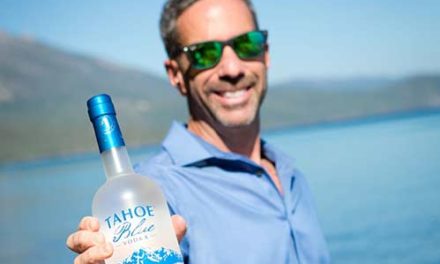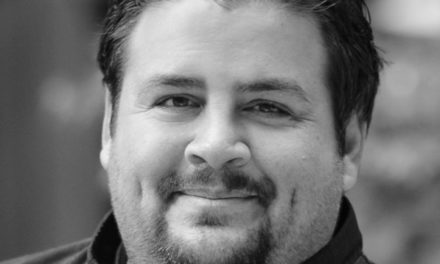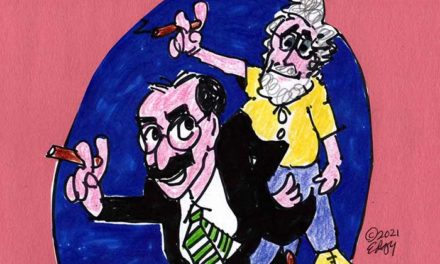Recalling That Other Brother: A Tribute
There was a third member of The Flying Goldmans
By Ed Goldman
My brother Stuart would have turned 76 tomorrow but instead, in his early 50s, lost a battle to Hepatitis C, which morphed into cirrhosis.
The nightmare had started when a laboratory sent out a batch of tainted Gamma Globulin; Stu had been receiving regular infusions of it in a self-designed quest to improve his immune system, which actually had been okay but he felt he caught colds too often. Stu and others sued the manufacturer and won settlements; in Stu’s case, it was $2.2 million, 50 percent of which went to the law firm representing him and a number of fellow victims in their class-action suit. He lived to receive the payout—but not much longer.
Stuart in the middle (The Flying Goldmans)
This past January I wrote about our eldest brother, Jerry, on the occasion of his 81st birthday. Stuart was the middle brother. Five years younger than Jerry and four years older than me, he had the difficult task of being close to each of us but never at the same time.
Before I was born, Stu and Jerry were inseparable. When I was a kid, Jerry wasn’t around much—being a popular teenager in New York, then a young working man in California, then a U.S. Army enlistee—so Stu and I became tight pals.
A test of his patience and smarts occurred one afternoon when our parents were at work. He was 14, I was 10, and we decided to play tag all over our house, which wasn’t big, ending with my ducking into the sole bathroom, slipping and falling butt-first through the glass shower door.
I was fine but we both figured when our parents got home we’d be fricasseed. So Stu wrote a thoughtful note and taped it to the battered metal frame of the shower door:
“Dear Mom, Ed slipped and fell through the shower door. He’s fine and we’re going to the park to play flag football. Wish us luck!—Stuart”
We did go off to play football but I was nervous the whole time about the reception we’d be walking into when we returned home. I kept wishing the game would go on forever, like some mythic contest between rival gods on Olympus. Finally walking home, Stu saw I was frazzled and said, “Relax, Mom’ll see the door, see my note and be so glad to see you’re not dead, everything’ll be okay.”
It went just that way—though when our dad got home, noted the damage and calculated (aloud) what it would cost to repair the door, I’m not entirely sure he was relieved I had survived.
Stuart had a dry sense of humor, as many engineers do. One of his favorite jokes was, “The answer to everything in the universe was the number 3.”
The other was this: Three Frenchmen are facing execution for horrible crimes but are promised that if the guillotine somehow fails, they’ll be set free. The first guy, a confessed murderer, is pardoned when the device doesn’t work. Same thing for the next guy, a notorious war criminal. The third guy, an engineer, is placed in position, looks up at the fatal blade and says, “Ah, I think I see the problem.”
Stu never cried and he detested sentimentality. He played jazz guitar because it represented a mathematical problem for him, not because he liked the music that much.
But he was remarkably generous as an older brother from the time I was 10 until I was 15. As aforementioned, he’d not only invite me to join him and his buddies to play flag football in the park—to clarify, we may have worn the “flags” in our waistbands but we still tackled each other, with nary a helmet, shin guard nor shoulder pad in sight—but also would let me tag along with his posse. We’d go to John Wayne and Steve McQueen movies and to folk-music clubs and coffee houses, like The Ice House in Pasadena, The Prison of Socrates in Balboa and The Troubador in West Hollywood.
My middle brother always made me feel as though we were contemporaries, even though I was always afraid I’d blurt out something age-revealing at the wrong moment, whether it was a profanity he and his pals had already outgrown or typical kid-brother whines like “I’m hungry” or “Why’d we park so far from the entrance?”
The jazz guitarist (painting by Edgy)
Stu eventually ran his own engineering firm in Fremont, California. This is when he began those ill-fated infusions that would claim his life. We remained friends as grown men but his illness understandably shortened his temper and weakened his tolerance for almost everything, including nightly phone conversations with me, during which I’d try to recapture the funny back-and-forth we’d had as kids. But there was no humor left in him—and I’d be lying if I didn’t say the calls had grown emotionally exhausting for me.
The night after he died at Stanford University’s hospital awaiting a liver transplant that never came, I went upstairs to my office to make my regular phone call and as I picked up the receiver I suddenly remembered he was gone. And, may God forgive me, I was relieved.
Our eldest brother Jerry had put his own life pretty much on hold to come out from Texas to be with Stu in those last few weeks, and our mom, already in her 80s, flew up from Southern California to do what only moms instinctively know how to do, no matter how old her kids are. She told Stu he was going to get his liver transplant and he was going to live to an old age.
When Stu, ever the cynic, recounted that story the last time I saw him, I expected him to issue a snarky remark. Instead he said, in his usual, unsentimental monotone, “You know there’s something really compelling about it when your mom says you’re going to survive.” I was fighting off my own tears when I noticed his. And it occurred to me in that highly charged moment that it was the first time in my life I’d ever seen him cry. And the last time.
Ed Goldman's column appears almost every Monday, Wednesday and Friday. A former daily columnist for the Sacramento Business Journal, as well as monthly columnist for Sacramento Magazine and Comstock’s Business Magazine, he’s the author of five books, two plays and one musical (so far).














